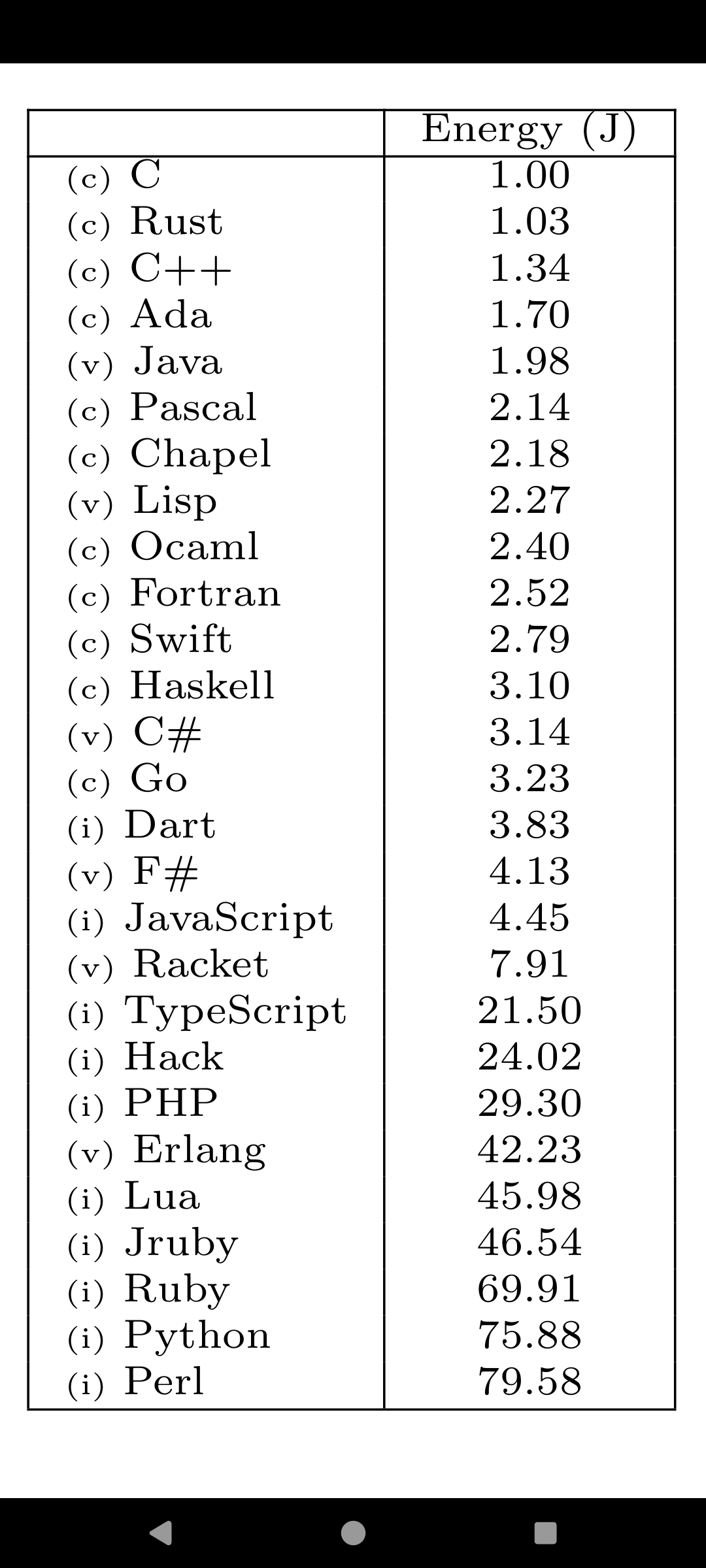Machine energy, definitely not programmer energy ;)
Programming
Welcome to the main community in programming.dev! Feel free to post anything relating to programming here!
Cross posting is strongly encouraged in the instance. If you feel your post or another person's post makes sense in another community cross post into it.
Hope you enjoy the instance!
Rules
Rules
- Follow the programming.dev instance rules
- Keep content related to programming in some way
- If you're posting long videos try to add in some form of tldr for those who don't want to watch videos
Wormhole
Follow the wormhole through a path of communities !webdev@programming.dev
I would argue that because C is so hard to program in, even the claim to machine efficiency is arguable. Yes, if you have infinite time for implementation, then C is among the most efficient, but then the same applies to C++, Rust and Zig too, because with infinite time any artificial hurdle can be cleared by the programmer.
In practice however, programmers have limited time. That means they need to use the tools of the language to save themselves time. Languages with higher levels of abstraction make it easier, not harder, to reach high performance, assuming the abstractions don’t provide too much overhead. C++, Rust and Zig all apply in this domain.
An example is the situation where you need a hash map or B-Tree map to implement efficient lookups. The languages with higher abstraction give you reusable, high performance options. The C programmer will need to either roll his own, which may not be an option if time Is limited, or choose a lower-performance alternative.
I understand your point but come on, basic stuff has been implemented in a thousand libraries. There you go, a macro implementation
I’m not saying you can’t, but it’s a lot more work to use such solutions, to say nothing about their quality compared to std solutions in other languages.
And it’s also just one example. If we bring multi-threading into it, we’re opening another can of worms where C doesn’t particularly shine.
This doesn't account for all the comfort food the programmer will have to consume in order to keep themselves sane
For those who don't want to open threads, it's a link to a paper on energy efficiency of programming languages.
Results

Also the difference between TS and JS doesn't make sense at first glance. 🤷♂️ I guess I need to read the research.
My first thought is perhaps the TS is not targeting ESNext so they're getting hit with polyfills or something
I guess we can take the overhead of rust considering all the advantages. Go however... can't even.
For Lua I think it's just for the interpreted version, I've heard that LuaJIT is amazingly fast (comparable to C++ code), and that's what for example Löve (game engine) uses, and probably many other projects as well.
WASM would be interesting as well, because lots of stuff can be compiled to it to run on the web
I would be interested in how things like MATLAB and octave compare to R and python. But I guess it doesn't matter as much because the relative time of those being run in a data analysis or research context is probably relatively low compared to production code.
Is there a lot of computation-intensive code being written in pure Python? My impression was that the numpy/pandas/polars etc kind of stuff was powered by languages like fortran, rust and c++.
Looking at the Energy/Time ratios (lower is better) on page 15 is also interesting, it gives an idea of how "power hungry per CPU cycle" each language might be. Python's very high
Every time I get surprised by the efficiency of Lisp! I guess they mean Common Lisp there, not Clojure or any modern dialect.
and in most cases that's not good enough to justify choosing c
I wouldn't justify using any language based on this metric alone.
For raw computation, yes. Most programs aren't raw computation. They run in and out of memory a lot, or are tapping their feet while waiting 2ms for the SSD to get back to them. When we do have raw computation, it tends to be passed off to a C library, anyway, or else something that runs on a GPU.
We're not going to significantly reduce datacenter energy use just by rewriting everything in C.
We're not going to significantly reduce datacenter energy use just by rewriting everything in C.
We would however introduce a lot of bugs in the critical systems
Ah this ancient nonsense. Typescript and JavaScript get different results!
It's all based on
https://en.wikipedia.org/wiki/The_Computer_Language_Benchmarks_Game
Microbenchmarks which are heavily gamed. Though in fairness the overall results are fairly reasonable.
Still I don't think this "energy efficiency" result is worth talking about. Faster languages are more energy efficient. Who new?
Edit: this also has some hilarious visualisation WTFs - using dendograms for performance figures (figures 4-6)! Why on earth do figures 7-12 include line graphs?

I just learned about Zig, an effort to make a better C compatible language. It's been really good so far, I definitely recommend checking it out! It's early stages for the community, but the core language is pretty developed and is a breath of fresh air compared to C.
Your link links to facebook that links to https://haslab.github.io/SAFER/scp21.pdf
Written in 2021 and not including julia is weird imo. I'm not saying it's faster but one should include it in a comparison.
And they used bit.ly on page 5 for references.
Haven't read it yet, but already seems very non-serious to me.
True but it's also a cock to write in
What if we make a new language that extends it and makes it fun to write? What if we call it c+=1?
If you want top speed, Fortran is faster than C.
